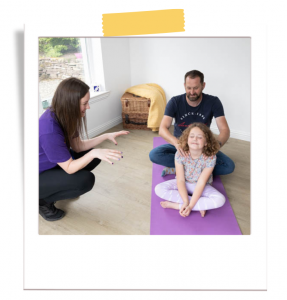
Teacher to Entrepreneur Lessons with Karen Gibb: Education Business Club podcast
November 1, 2024
Inspiring children to support human rights – 5 ways to educate children
December 6, 2024As winter approaches, many people find it harder to maintain a positive mindset.
Cold weather, shorter days, and holiday pressures can harm our physical and mental health.
Whether or not someone in your family is diagnosed with seasonal affective disorder (SAD), winter can feel heavy for everyone.
Keeping the whole family mentally and emotionally healthy during this season might require extra thought and effort. It’s essential to manage the challenges winter brings proactively.
We need to pay closer attention to how we care for ourselves and our children. It’s essential to uphold healthy habits, especially when things become more challenging.
To make the colder months more manageable, it’s important to start planning ahead and implement some simple strategies. These steps can benefit everyone.
If you’re looking for additional support to help your family cope this winter, consider joining our Mind Marvels community sessions.

1. Stick to routines
You’ve likely heard it many times, but routines are incredibly important for both kids and adults. Having a consistent daily structure, especially around sleep, meals, and family activities, can help maintain your mood during the darker winter months.
Routines create a sense of stability and predictability that can be comforting during a season when many other factors feel out of control—like bad weather or less daylight.
Regular routines provide children with a sense of security. Knowing what to expect can reduce stress and anxiety, which can spike during the winter months.
For example, sticking to regular meal times and bedtime routines, even when the excitement of the holidays threatens to throw things off, helps keep kids grounded. It also supports their overall wellbeing, ensuring they get the rest they need to stay healthy and energised.
Adults benefit from structure too. It can be easy to let winter throw your usual habits off-course—maybe you start sleeping in more or skipping your regular workout.
By keeping up with routines like morning stretches or an evening family check-in, you can maintain balance and ward off some of the fatigue and sadness that winter sometimes brings.
2. Prioritising healthy habits
Alongside routines, it’s important to consciously prioritise healthy habits during the winter months.
This is a great opportunity to involve your kids in the process and make healthy living fun for the whole family. Ask them to brainstorm ideas for winter-friendly activities they’d enjoy doing regularly. Giving children a say in family plans makes them feel included and helps ensure they’ll be excited to participate.
For example, maybe your child suggests a daily after-school walk in the park, even if it’s cold outside. While bundling up for outdoor activities can feel like an extra chore, getting fresh air and staying active can make a big difference in lifting your mood and increasing your energy.
Another idea might be to explore new indoor activities, like experimenting with healthy recipes found on cooking blogs. Cooking together as a family can be a fun and rewarding way to make cold days feel more enjoyable.
It’s not just about physical health either—mental and emotional habits are just as important.
Encourage your kids to take part in mindfulness exercises, such as short meditation sessions or breathing exercises, to help manage stress and stay calm when winter feels overwhelming.
These habits can support everyone’s wellbeing and make the colder months more bearable.
3. Be realistic in your expectations
Winter is a busy time for most families, with work, school, and holiday responsibilities piling up. It’s easy to set lofty goals for staying healthy and happy through the season, only to feel disappointed when things don’t go as planned.
That’s why it’s important to set realistic expectations for your family rather than striving for perfection.
Aiming for solutions outside of your reach can lead to frustration. For example, deciding that your family needs to exercise daily to stay fit might sound like a great plan, but it could be hard to pull off with everyone’s schedules.
Instead, try to come up with alternative options that feel achievable, even with winter’s challenges.
Perhaps you can organise a weekly family basketball game in the garden or take turns picking music for a weekend dance party in the living room. These small adjustments can make staying active feel more fun and less of a chore.
Additionally, don’t give yourself and your family a hard time. Winter can be difficult for everyone, so rather than being hard on yourselves for not meeting every goal, celebrate the small wins.
Even getting outside for a 10-minute walk, or sitting down for a family meal together, is a victory worth acknowledging.
4. Team work
One of the best ways to make winter easier is by approaching the season as a family. When one person is struggling—whether it’s a child dealing with sadness or an adult feeling overwhelmed—it helps to think about what would benefit the family as a whole.
Start by having a family discussion about what kinds of activities or habits will help each person feel more positive during the winter months.
One child may be feeling the winter blues and could use extra support.
Implementing family practices, like checking in with each other daily or scheduling time for fun and shared activities, can make a big difference.
Working together strengthens family bonds and helps keep everyone accountable. If you’ve decided as a family to prioritise healthy eating or regular outdoor time, you’re more likely to stick with it when everyone is on board.
Supporting each other in these efforts will help everyone stay on track and tackle winter’s challenges together.
5. Watch out for warning signs
While many experience some winter blues, it’s important to recognise when more serious issues may be at play.
If someone in your family—especially a child—starts showing signs of depression, anxiety, or major behavioural changes, it’s crucial to step in and seek support.
A drastic change in mood, such as losing interest in activities they used to enjoy or withdrawing from family life, could indicate that they’re struggling with something deeper than just a seasonal slump.
In these cases, talking to a professional, such as a therapist or counsellor, might be necessary to help address underlying concerns.
Remember, mental health is just as important as physical health, and seeking help when needed is a proactive step in supporting your family’s overall wellbeing.
Prepare for winter together
Winter can be tough, but it doesn’t have to be overwhelming.
Your family can make it through the colder months with more positivity and balance by sticking to routines, prioritising healthy habits, setting realistic expectations, and working as a team.
